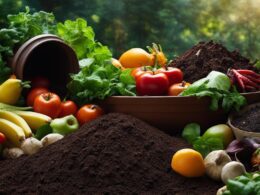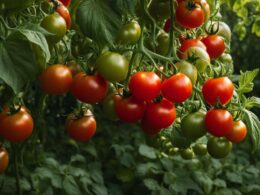Do you want to maintain a healthy garden? Then mulch matters! Mulch is a crucial element for your garden’s well-being. It enhances the appearance of your garden while also retaining soil moisture, reducing soil erosion, and deterring weed growth.
However, over time, mulch can break down, become a breeding ground for pests or fungi, or wash away due to heavy rain or wind. This raises the question of whether old mulch should be removed every year or not.
In this article, you will learn the importance of mulch, reasons for mulch replacement, when to remove old mulch, signs that indicate you need to add or replace mulch, types of mulch, and how to calculate mulch needs.
By the end of this article, you will have a better understanding of how to maintain a healthy garden, ensuring the safety and beauty of your outdoor space. So, let’s dive into the world of mulch!
Quick Takeaways
- Mulch is important for maintaining a healthy garden and enhancing appearance
- Proper application techniques include regularly checking thickness and keeping it at least two inches away from plant stems
- Organic materials decompose and add nutrients to soil, while rubber mulch is long-lasting and low-maintenance
- Regularly adding new mulch can prevent weed infestations and erosion, while old mulch can become a breeding ground for pests or fungi
Is Mulching a Sustainable Landscaping Practice?
Mulching is one of the most effective sustainable landscaping tips for your home. It retains soil moisture, regulates temperature, and suppresses weed growth, reducing the need for water and herbicides. Additionally, mulch improves soil health, prevents erosion, and adds aesthetic appeal. By utilizing mulch, you can create a sustainable and eco-friendly landscape that benefits both your property and the environment.
Importance and Benefits
You should know about the importance and benefits of mulch, as it can have a significant impact on your garden’s long-term health and maintenance.
Mulch deters weed growth, retains soil moisture, insulates soil against temperature extremes, reduces soil erosion, adds organic matter to soil when it decomposes, and improves overall appearance.
By using mulch, you can save time and money by reducing the need for watering, weeding, and other maintenance tasks. It also helps create a healthier environment for your plants to grow in, improving their longevity and overall health.
So, make sure to consider the benefits of mulch when planning your garden maintenance routine.
Signs for Replacement
If the layer of material in your garden appears very thin and fine, it may be time to consider adding or replacing it. A thin layer of mulch can lead to a variety of problems, such as weed growth, soil erosion, and loss of moisture.
Preventive maintenance is key to keeping your garden healthy and thriving. To ensure your mulch is doing its job, check its thickness regularly. If the layer has shrunk to under two inches, it’s time to add more.
Don’t wait until it’s too late and you’re dealing with weed infestations or soil erosion. Regularly adding new mulch not only improves the health of your plants, but it also adds to the overall aesthetic of your garden.
Keep your garden safe and healthy by keeping an eye on your mulch thickness.
Types and Calculating Needs
Calculating the total cubic feet of mulch needed for your garden is crucial before purchasing.
Organic materials and rubber mulch are two popular options for gardeners. Organic materials, such as wood chips, bark, and leaves, are eco-friendly and decompose over time, adding nutrients to the soil. Rubber mulch, made from recycled materials, is a long-lasting and low-maintenance option.
Mulch application techniques also play a vital role in ensuring your garden’s health. When applying mulch, make sure to keep it at least two inches away from plant stems to prevent rotting and fungal growth. Additionally, avoid piling mulch too high, as it can suffocate plant roots and prevent water from reaching them.
By selecting the right type of mulch and applying it correctly, you can enjoy the many benefits it provides to your garden.
Frequently Asked Questions
Are there any types of plants or trees that should not be mulched?
Mulching perennials: best practices include using organic mulch and avoiding piling it against the plant stem. Mulching fruit trees: dos and don’ts involve avoiding using too much mulch and keeping it away from the trunk.
How often should mulch be applied to maintain its effectiveness?
To maintain effectiveness, mulch should be applied once or twice a year. Check plant compatibility and avoid excessive mulch harm. Old mulch removal is necessary to prevent pest attraction. Best practices include proper depth and avoiding piling against plants. Benefits include weed control and moisture retention, while drawbacks include fungal growth and excess heat retention.
Can using too much mulch be harmful to plants?
Avoid overmulching your plants by only using the recommended amount. Consider mulch alternatives like gravel or rocks. Too much mulch can suffocate roots and lead to moisture buildup, harming your plants.
Is it necessary to remove old mulch before adding new layers?
Yes, it’s important to remove old mulch before adding new layers. This ensures proper aeration and prevents pests or fungi from forming. Apply new mulch in a 2-4 inch layer for maximum benefits of mulching.
Can mulch attract pests or rodents to the garden?
Yes, mulch can attract insects and rodents to your garden. They are attracted to the moisture and organic material in the mulch. To avoid this, use mulch made from cedar or cypress and avoid over-applying it.
Conclusion
So, should you remove old mulch or not? The answer depends on the condition of your current mulch and your garden’s needs. If the mulch is breaking down, has pest or fungal issues, or has been washed away, it’s time for a replacement.
However, if the mulch is still in good condition and providing the necessary benefits, there’s no need to remove it. Remember to keep an eye out for signs of needing mulch replacement, such as soil erosion, weed growth, or decreased moisture retention.
Consider the type of mulch best suited for your garden and calculate the appropriate amount needed. By maintaining your mulch properly, you can enjoy a healthy and thriving garden.









